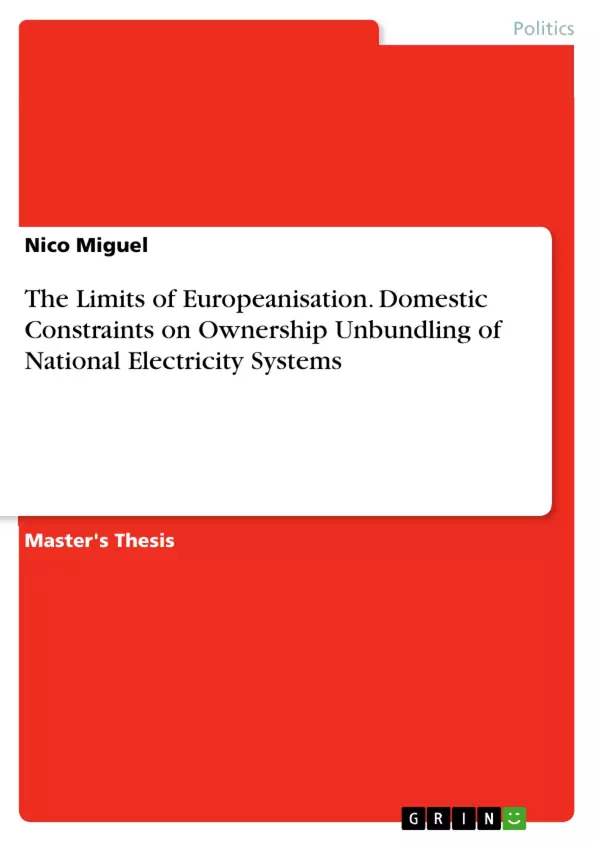
The Limits of Europeanisation. Domestic Constraints on Ownership Unbundling of National Electricity Systems
Masterarbeit, 2020
54 Seiten, Note: 1,7
Leseprobe
Inhaltsverzeichnis (Table of Contents)
- Introduction
- I. Unbundling as Key Ingredient for the Internal Market of Electricity.
- Unbundling Options after the Third Electricity Directive
- II. Costs and Benefits of Ownership Unbundling..
- Theoretical Framework.
- The Goodness-of-Fit Hypothesis...
- Rational-Choice Institutionalism
- Path Dependence .....
- III. Research Design....
- Variables and Hypotheses: The Determinants of Unbundling Regime Choice........
- Methodology.
- IV. Quantitative Analysis.
- Decision-Theoretic Model
- V. Qualitative Analysis.
- Case Selection.
- Case Study Germany.
- Case Study Netherlands
- Conclusion.
- References......
Zielsetzung und Themenschwerpunkte (Objectives and Key Themes)
This master thesis examines the extent to which domestic constraints impact the implementation of European Union directives regarding the unbundling of national electricity systems. It aims to shed light on the complex interplay between European integration goals and national policy preferences, particularly focusing on the varying levels of unbundling adopted by member states.
- The impact of domestic political and economic factors on the implementation of European directives.
- The role of national governance structures and interest groups in shaping the pace and nature of electricity market liberalization.
- The challenges of achieving a truly competitive internal market in electricity due to national-level constraints.
- The impact of ownership structures of vertically integrated utilities (VIUs) on market competition.
- The effectiveness of different unbundling models in promoting competition and fostering a level playing field in the electricity sector.
Zusammenfassung der Kapitel (Chapter Summaries)
The thesis begins with a thorough introduction to the concept of unbundling in the context of the European electricity market. It explores the historical development of the market and the rationale behind the unbundling approach. Chapter I delves deeper into the different unbundling options available to member states under the Third Electricity Directive, highlighting the key differences between 'hard' and 'soft' unbundling regimes. Chapter II lays out the theoretical framework underpinning the research, drawing on various theories such as rational-choice institutionalism and path dependence to explain the factors influencing the choice of unbundling model. It also examines the costs and benefits associated with unbundling. Chapter III outlines the research design, specifying the variables and hypotheses used to analyze the determinants of unbundling regime choice. It details the mixed-method approach employed, encompassing both quantitative and qualitative analyses. Chapter IV presents the quantitative analysis, focusing on the decision-theoretic model developed to explain the choice of unbundling regime. Chapter V delves into the qualitative analysis, presenting case studies of Germany and the Netherlands to gain a deeper understanding of the specific factors influencing unbundling decisions in practice. The conclusion summarizes the findings and their implications, highlighting the significance of domestic constraints in shaping the implementation of European integration goals in the electricity sector.
Schlüsselwörter (Keywords)
The main keywords of the thesis include: Europeanization, electricity market liberalization, unbundling, vertically integrated utilities, domestic constraints, national governance, interest groups, rational-choice institutionalism, path dependence, benefit-cost analysis, decision-theoretic model, case studies, Germany, Netherlands. The thesis focuses on the interplay between European integration goals and national policy preferences, exploring the factors that shape the implementation of EU directives in the electricity sector, particularly the unbundling of ownership structures.
Frequently Asked Questions
What is "unbundling" in the electricity sector?
Unbundling refers to the separation of electricity generation and sales from the operation of transmission networks to promote competition and prevent monopolies.
Why do European countries choose different unbundling regimes?
Variation is explained by domestic constraints, such as the costs of compensating "losers" of reform and the influence of national political veto players and interest groups.
What is the "Goodness-of-Fit" framework?
It is a theoretical framework by Börzel & Risse used to analyze how well European directives fit within existing national institutions and the resulting pressure for adaptation.
How does "path dependence" affect electricity reform?
Path dependence suggests that historical institutional choices and established ownership structures (like VIUs) make it difficult and costly for countries to switch to new models.
What are the cases studied in this thesis?
The thesis provides a qualitative analysis comparing the unbundling decisions and domestic factors in Germany and the Netherlands.
Details
- Titel
- The Limits of Europeanisation. Domestic Constraints on Ownership Unbundling of National Electricity Systems
- Hochschule
- Universiteit Maastricht
- Note
- 1,7
- Autor
- Nico Miguel (Autor:in)
- Erscheinungsjahr
- 2020
- Seiten
- 54
- Katalognummer
- V908564
- ISBN (eBook)
- 9783346203687
- ISBN (Buch)
- 9783346203694
- Sprache
- Englisch
- Schlagworte
- constraints domestic electricity europeanisation limits national ownership systems unbundling
- Produktsicherheit
- GRIN Publishing GmbH
- Preis (Ebook)
- US$ 19,99
- Preis (Book)
- US$ 29,99
- Arbeit zitieren
- Nico Miguel (Autor:in), 2020, The Limits of Europeanisation. Domestic Constraints on Ownership Unbundling of National Electricity Systems, München, Page::Imprint:: GRINVerlagOHG, https://www.diplomarbeiten24.de/document/908564
- Autor werden
- Ihre Optionen
- Vertriebskanäle
- Premium Services
- Autorenprofil
- Textarten und Formate
- Services für Verlage, Hochschulen, Unternehmen

- © GRIN Publishing GmbH.
- Alle Inhalte urheberrechtlich geschützt. Kopieren und verbreiten untersagt.
- info@grin.com
- AGB
- Open Publishing
Der GRIN Verlag hat sich seit 1998 auf die Veröffentlichung akademischer eBooks und Bücher spezialisiert. Der GRIN Verlag steht damit als erstes Unternehmen für User Generated Quality Content. Die Verlagsseiten GRIN.com, Hausarbeiten.de und Diplomarbeiten24 bieten für Hochschullehrer, Absolventen und Studenten die ideale Plattform, wissenschaftliche Texte wie Hausarbeiten, Referate, Bachelorarbeiten, Masterarbeiten, Diplomarbeiten, Dissertationen und wissenschaftliche Aufsätze einem breiten Publikum zu präsentieren.
Kostenfreie Veröffentlichung: Hausarbeit, Bachelorarbeit, Diplomarbeit, Dissertation, Masterarbeit, Interpretation oder Referat jetzt veröffentlichen!
- GRIN Verlag GmbH
-
- Nymphenburger Str. 86
- 80636
- Munich, Deutschland
- +49 89-550559-0
- +49 89-550559-10
- info@grin.com
-









